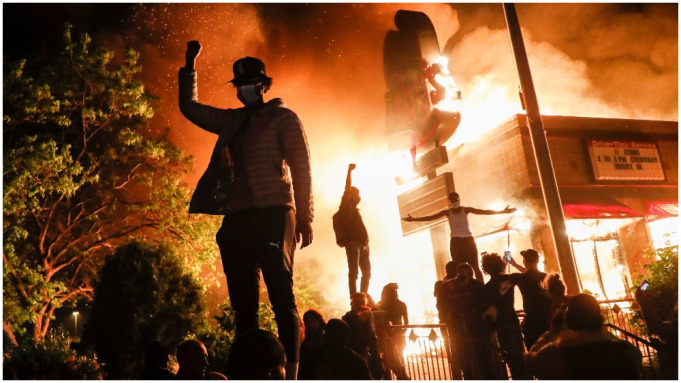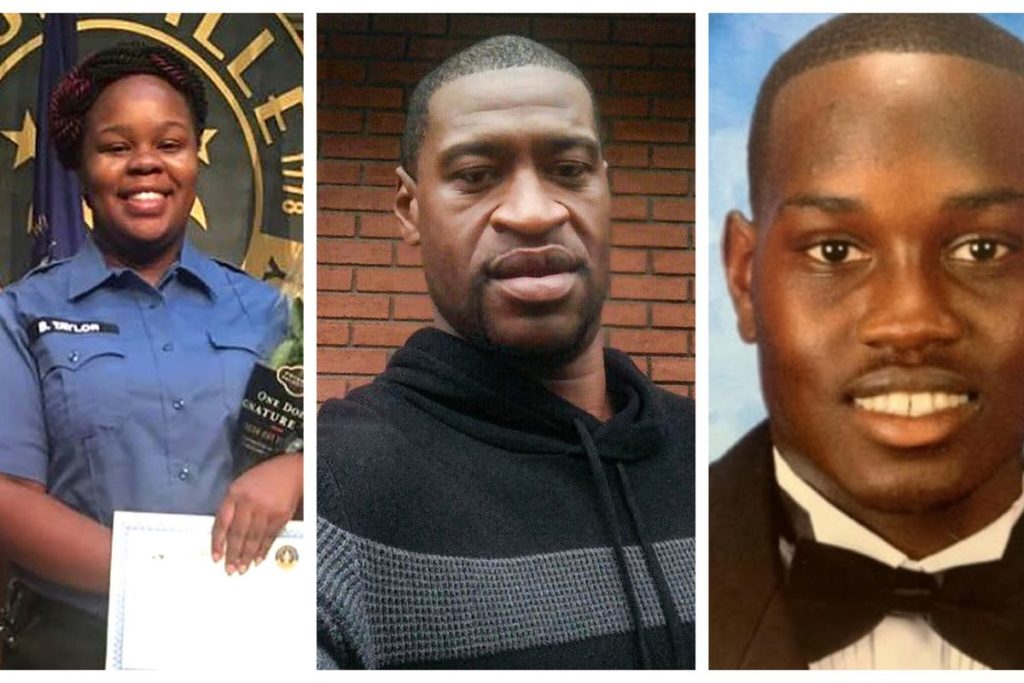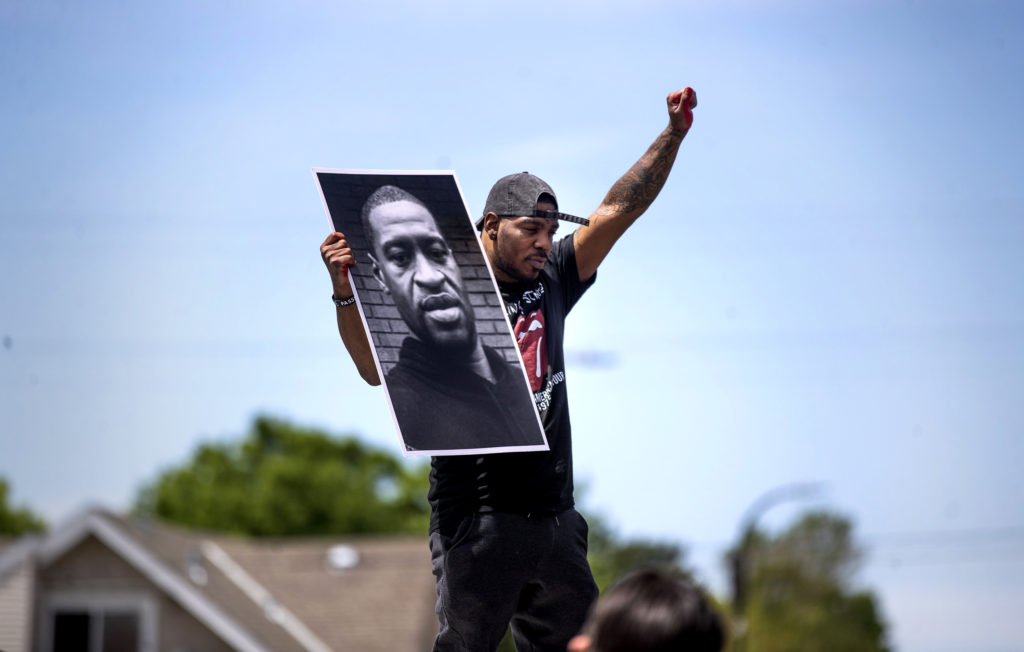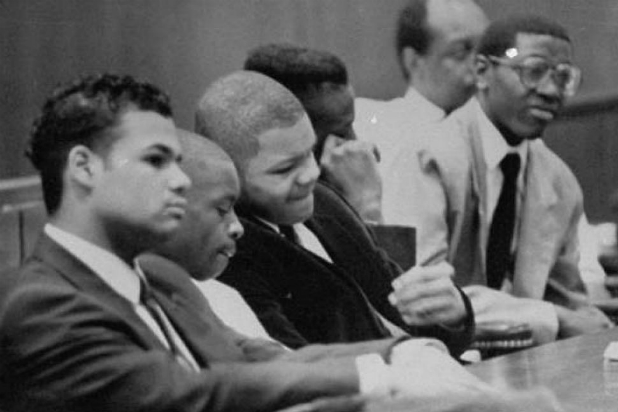Geogre Flyod seems to be the straw that broke the camels back!
Before you head out or speak up please be well versed on your constitutional rights as a citizen of the United States of America.

1st Amendment
Prohibits Congress from making any law respecting an establishment of religion, impeding the free exercise of religion, abridging the freedom of speech, infringing on the freedom of the press, interfering with the right to peaceably assemble or prohibiting the right to petition the government
4th Amendment
The right of the people to be secure in their persons, houses, papers, and effects, against unreasonable searches and seizures, shall not be violated, and no Warrants shall issue, but upon probable cause, supported by Oath or affirmation, and particularly describing the place to be searched, and the persons or things to be seized.

7th Amendment
In Suits at common law, where the value in controversy shall exceed twenty dollars, the right of trial by jury shall be preserved, and no fact tried by a jury, shall be otherwise reexamined in any Court of the United States, than according to the rules of the common law.
10th Amendment
The powers not delegated to the United States by the Constitution, nor prohibited by it to the States, are reserved to the States respectively, or to the people.
13th Amendment
16th Amendment
The Congress shall have power to lay and collect taxes on incomes, from whatever source derived, without apportionment among the several States, and without regard to any census or enumeration.
19th Amendment
The right of citizens of the United States to vote shall not be denied or abridged by the United States or by any State on account of sex.
Congress shall have power to enforce this article by appropriate legislation.
22nd Amendment
Two-Term Limit on Presidency
25th Amendment
Presidential Disability and Succession

2nd Amendment
“A well regulated Militia, being necessary to the security of a free State, the right of the people to keep and bear Arms, shall not be infringed.”
5th Amendment
No person shall be held to answer for a capital, or otherwise infamous crime, unless on a presentment or indictment of a Grand Jury, except in cases arising in the land or naval forces, or in the Militia, when in actual service in time of War or public danger; nor shall any person be subject for the same offence to be twice put in jeopardy of life or limb; nor shall be compelled in any criminal case to be a witness against himself, nor be deprived of life, liberty, or property, without due process of law; nor shall private property be taken for public use, without just compensation.

8th Amendment
Excessive bail shall not be required, nor excessive fines imposed, nor cruel and unusual punishments inflicted.
11th Amendment
The Judicial power of the United States shall not be construed to extend to any suit in law or equity, commenced or prosecuted against one of the United States by Citizens of another State, or by Citizens or Subjects of any Foreign State.
14th Amendment
Citizenship Rights, Equal Protection, Apportionment, Civil War Debt
17th Amendment
The Senate of the United States shall be composed of two Senators from each State, elected by the people thereof, for six years; and each Senator shall have one vote. The electors in each State shall have the qualifications requisite for electors of the most numerous branch of the State legislatures.
When vacancies happen in the representation of any State in the Senate, the executive authority of such State shall issue writs of election to fill such vacancies: Provided, That the legislature of any State may empower the executive thereof to make temporary appointments until the people fill the vacancies by election as the legislature may direct.
This amendment shall not be so construed as to affect the election or term of any Senator chosen before it becomes valid as part of the Constitution.
17th Amendment
Presidential Term and Succession, Assembly of Congress
23rd Amendment
26th Amendment
Section 1
The right of citizens of the United States, who are eighteen years of age or older, to vote shall not be denied or abridged by the United States or by any State on account of age.
Section 2
The Congress shall have power to enforce this article by appropriate legislation.
3rd Amendment
No Soldier shall, in time of peace be quartered in any house, without the consent of the Owner, nor in time of war, but in a manner to be prescribed by law.
6th Amendment
In all criminal prosecutions, the accused shall enjoy the right to a speedy and public trial, by an impartial jury of the State and district wherein the crime shall have been committed, which district shall have been previously ascertained by law, and to be informed of the nature and cause of the accusation; to be confronted with the witnesses against him; to have compulsory process for obtaining witnesses in his favor, and to have the Assistance of Counsel for his defence.
9th Amendment
The enumeration in the Constitution, of certain rights, shall not be construed to deny or disparage others retained by the people.
12th Amendment
15th Amendment
Right to Vote Not Denied by Race
18th Amendment
21st Amendment
24th Amendment
27th Amendment
No law, varying the compensation for the services of the Senators and Representatives, shall take effect, until an election of representatives shall have intervened.


Something Black Child Should know.
What Are Your Miranda Rights?
The wording used when a person is read the Miranda Warning, also known as being ‘Mirandized,’ is clear and direct:
“You have the right to remain silent. Anything you say can and will be used against you in a court of law. You have the right to an attorney. If you cannot afford an attorney, one will be provided for you. Do you understand the rights I have just read to you? With these rights in mind, do you wish to speak to me?”
When The Police Must Read Your Rights
It is important to note that police are only required to Mirandize a suspect if they intend to interrogate that person under custody. Arrests can occur without the Miranda Warning being given. If the police later decide to interrogate the suspect, the warning must be given at that time. Their vigilance to this rule means less chance of a case being overturned in court due to poor procedure on their part.
If public safety is an issue, questions may be asked without the defendant being Mirandized, and any evidence obtained may be used against the suspect under these circumstances. The Miranda Warning is all about questioning and being protected from self-incrimination under the Fifth Amendment, not being arrested.
The person arrested must still answer questions asked about their name, age, address, etc. They can be searched in order to protect the police officer. Also, a confession given before a suspect has been read the Miranda Warning may find that confession entered as evidence in court.
If you have been Mirandized and you waive your rights, meaning you wish to speak to police freely without an attorney present, you can change your mind at any time and ‘plead the fifth,’ meaning you no longer wish to answer questions, or that you have changed your mind and wish to have an attorney present after all.
In some states, juveniles have the right to remain silent without his or her parent or guardian present.
US military branches provide for the right against self-incrimination by providing a form that informs the suspect of the charges and their rights. They are required to sign the form. Read more about Article 31 vs. Miranda.
Your rights
- You have the right to remain silent. For example, you do not have to answer any questions about where you are going, where you are traveling from, what you are doing, or where you live. If you wish to exercise your right to remain silent, say so out loud. (In some states, you may be required to provide your name if asked to identify yourself, and an officer may arrest you for refusing to do so.)
- You do not have to consent to a search of yourself or your belongings, but police may pat down your clothing if they suspect a weapon. Note that refusing consent may not stop the officer from carrying out the search against your will, but making a timely objection before or during the search can help preserve your rights in any later legal proceeding.
- If you are arrested by police, you have the right to a government-appointed lawyer if you cannot afford one.
- You do not have to answer questions about where you were born, whether you are a U.S. citizen, or how you entered the country. (Separate rules apply at international borders and airports as well as for individuals on certain nonimmigrant visas, including tourists and business travelers. For more specific guidance about how to deal with immigration-related questions, see our immigrants’ rights section.)
How to reduce risk to yourself
- Stay calm. Don’t run, resist, or obstruct the officers. Do not lie or give false documents. Keep your hands where the police can see them.
What to do if you are arrested or detained
- Say you wish to remain silent and ask for a lawyer immediately. Don’t give any explanations or excuses. Don’t say anything, sign anything, or make any decisions without a lawyer.
- If you have been arrested by police, you have the right to make a local phone call. The police cannot listen if you call a lawyer. They can and often do listen if you call anyone else.
If you believe your rights were violated
- Write down everything you remember, including officers’ badges and patrol car numbers, which agency the officers were from, and any other details. Get contact information for witnesses.
- If you’re injured, seek medical attention immediately and take photographs of your injuries.
- File a written complaint with the agency’s internal affairs division or civilian complaint board. In most cases, you can file a complaint anonymously if you wish.
What you can do if you think you’re witnessing police abuse or brutality
- Stand at a safe distance and, if possible, use your phone to record video of what is happening. As long as you do not interfere with what the officers are doing and do not stand close enough to obstruct their movements, you have the right to observe and record events that are plainly visible in public spaces.
- Do not try to hide the fact that you are recording. Police officers do not have a reasonable expectation of privacy when performing their jobs, but the people they are interacting with may have privacy rights that would require you to notify them of the recording. In many states (see here) you must affirmatively make people aware that you are recording them.
- Police officers may not confiscate or demand to view your photographs or video without a warrant, and they may not delete your photographs or video under any circumstances. If an officer orders you to stop recording or orders you to hand over your phone, you should politely but firmly tell the officer that you do not consent to doing so, and remind the officer that taking photographs or video is your right under the First Amendment. Be aware that some officers may arrest you for refusing to comply even though their orders are illegal. The arrest would be unlawful, but you will need to weigh the personal risks of arrest (including the risk that officer may search you upon arrest) against the value of continuing to record.
- Whether or not you are able to record everything, make sure to write down everything you remember, including officers’ badge and patrol car numbers, which agency the officers were from, how many officers were present and what their names were, any use of weapons (including less-lethal weapons such as Tasers or batons), and any injuries suffered by the person stopped. If you are able to speak to the person stopped by police after the police leave, they may find your contact information helpful in case they decide to file a complaint or pursue a lawsuit against the officers.




